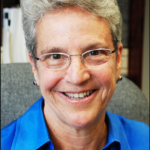Faculty & Staff
Health and the Public Interest Program Leadership

Adriane Fugh-Berman, M.D., (Co-Director) Department of Pharmacology and Physiology, and Department of Family Medicine.
Adriane Fugh-Berman, M.D. is a Professor of Pharmacology and Physiology with a joint appointment in the Department of Family Medicine. As director of PharmedOut’s, a Georgetown University Medical Center research and education project that promotes rational prescribing and exposes the effect of pharmaceutical marketing on prescribing practices. Dr. Fugh-Berman leads the team that has had a profound impact on prescribers’ perceptions of the consequences of industry marketing.
Dr. Fugh-Berman has authored many key articles in peer-reviewed literature on the area of physician-industry relationships and conflicts of interest. She collaborates with Dr. Susan Wood of George Washington University Milken Institute School of Public Health and the Washington D.C. Department of Health on the DC Center for Rational Prescribing (DCRx). This department provides industry-free continuing medical education and resources to Washington, D.C. prescribers and pharmacists.
Dr. Fugh-Berman is also an expert on botanical medicine and dietary supplements. She also directs Georgetown’s Urban Herbs project, which maintains ecological gardens on campus that intermix edible, medicinal, and ornamental plants. She is the author of a clinical textbook, The 5-Minute Herb and Dietary Supplement Consult.

Adam Myers, Ph.D. (Co-Director). Department of Pharmacology and Physiology.
Professor Adam Myers, Ph.D. is a Team Leader, and an Associate Dean and Assistant Vice President at the Georgetown University Medical Center, developing and implementing new biomedical graduate programs.
He has previously served as Associate Dean of Biomedical Graduate Education, as well as Director of the Special Master’s Program (SMP), and continues to contribute to the Program as a Team Leader. He is a perennial Golden Apple nominee, and has received awards from the Special Master’s Program class, as well as the Kaiser-Permanente Teacher of the Year Award. Dr. Myers teaches the cardiovascular portion of the Medical Cardiopulmonary Biology course, and has spearheaded the development and implementation of the biomedical graduate programs at the Georgetown / George Mason partnership (GeorgeSquared).
He received his Ph.D. from Georgetown University, and is a tenured Professor of Physiology in the Department of Pharmacology & Physiology. His research interests are cellular mechanisms of platelet and vascular function; mechanisms and mediators of shock, ischemia, and thrombosis; alcohol and platelet function. He is co-author (with Dr. Susan Mulroney) of the Netter’s Essential Physiology textbook, and author of the Crash Course Respiratory System textbook.
Health and the Public Interest Program Faculty and Instructors

Yulia Chentsova Dutton, PhD (Associate Professor, Department of Psychology).
Professor Yulia Chentsova Dutton, PhD has been teaching at Georgetown since 2007. She is a cultural psychologist. Her work is inspired by the core ideas of cultural psychology, particularly by the notion that it is possible for us to study culture in methodologically rigorous ways without losing sight of its complexity and essentializing it.
Dr. Chentsova Dutton’s research interests center on cultural shaping of emotions and social support. Her research bridges cultural and clinical psychology by examining how emotions and social support emerge from the interaction of universal tendencies (e.g., emotionally-valenced responses to personally relevant events, tendency to use social resources to solve problems), cultural scripts, and situational cues. Dr. Chentsova Dutton conducts research in East Asian, Russian and West African cultural contexts.
She is a native of Russia and received her undergraduate training from Williams College and graduate training from the University of Minnesota (in clinical science) and Stanford University (in affective science). She teaches courses in cultural, abnormal and personality psychology and affective science.

Anthony Scialli, MD (Department of Pharmacology and Physiology and Department of Ob-Gyn, Georgetown University Medical Center)
Dr. Scialli is an obstetrician-gynecologist and reproductive toxicologist. He was Director of the Ob-Gyn residency program at Georgetown for 17 years and founded the peer-reviewed journal Reproductive Toxicology. He continues to see patients and provides consultation in reproductive toxicology to government and private clients.

Lenette Golding, PhD, MPH (Adjunct Faculty, Graduate School of Arts & Science)
Dr. Golding has programmatic, quantitative, qualitative research, and teaching experience in public health and communication. She specializes in public health communication with an emphasis on social and behavior change. Her research and interests span sectors such as health communication, social psychology, education, human rights, community health and development. She is interested in communication’s role in addressing the challenges for improved health conditions around the world. Her other areas of interest include health psychology, behavioral and social theory, the representation of cultural knowledge about health and illness; narrative persuasion; media and message effects; and the use of entertainment-education for social change.

Pamela Saunders, PhD (Associate Professor, Department of Neurology, Department of Psychiatry)
Pamela A. Saunders, PhD is an Associate Professor in the departments of neurology and psychiatry. With a doctorate in sociolinguistics from Georgetown University, her research focuses on language, aging, doctor/patient communication, narrative and reflective writing, and standardized patient education. She has spent the last 20 years conducting research and teaching.
Her research portfolio includes funding from the Alzheimer’s Association, the National Institute on Aging, the Hartford Foundation, and the U.S. Food and Drug Administration. She serves in several leadership roles related to medical education, including chief course director of the doctoring curriculum and director of the geriatrics clerkship. Dr. Saunders is a long-standing member of Georgetown University Medical Center’s Committee on Medical Education and the Committee on Appointments and Promotions. She co-founded the geriatrics curriculum in 2000 for the medical students at Georgetown’s School of Medicine with funding from the Hartford Foundation. In addition, she teaches reflective writing and Mind-Body Medicine skills to medical and graduate students.

Sarah Knight Marvar, Ph.D. (Assistant Professor)
Dr. Knight Marvar is an SMP Team Leader and provides daily oversight of the Georgetown Downtown SMP campus. She is the course director for the Principles of Physiology and Introduction to Neurophysiology graduate courses. Dr. Knight Marvar also teaches non-cadaveric lectures in the Principles of Gross Anatomy and Biology of Health and Disease courses. Her research interests include pedagogical advances in science education and oxidative stress in hypertensive renal injury.

Vincent Marie Turbat, Ph.D. (Associate Professor)
Vincent Turbat started his career as a junior lecturer/researcher in economics in the French University of Saint Etienne in 1972. During his 19 years in different French universities, he shared his time between teaching and researching, mostly in macroeconomics, growth and development, and health economics. He joined the World Bank in 1991 as a health economist to develop and deliver learning programs for the health sector (health financing, health sector reform, pharmaceuticals, HIV/AIDS prevention and care). In 1996, he joined the operations sector of the World Bank, first in East Asia, then in Africa. From 2003 to 2006, he was the World Bank country manager for Niger. He retired from the World Bank in 2010 to go back to teaching and researching, to which he has added consulting. Turbat holds a PhD from the University of Aix-Marseille II (1977, highest honors), a DES from the University of Paris I, Pantheon-Sorbonne (1972, honors) and a masters in economics from the University of Orleans (1970, honors).

Judith Feder, Ph.D. (McCourt School of Public Policy)
Professor Judith Feder, Ph.D. is a Professor of Public Policy and, from 1999 to 2008, served as dean of what is now the McCourt School of Public Policy at Georgetown University. Dr. Feder has made her mark as a nationally recognized leader in health policy through both scholarship and public service. She is a widely published scholar. Her health policy research began at the Brookings Institution, continued at the Urban Institute, and, since 1984, flourished at Georgetown University.
In the late 1980s, Dr. Feder moved from policy research to policy leadership, actively promoting effective health reform as staff director of the congressional Pepper Commission (chaired by Sen. John D. Rockefeller IV) in 1989-90; Principal Deputy Assistant Secretary for Planning and Evaluation at the Department of Health and Human Services in President Bill Clinton’s first term; a senior fellow at the Center for American Progress (2008-2011) and, today, as an Institute Fellow at the Urban Institute. Dr. Feder is an elected member of the Institute of Medicine, the National Academy of Public Administration, and the National Academy of Social Insurance; a former chair and board member of Academy Health; a member of the Center for American Progress Action Fund Board, the Board of the National Academy of Social Insurance and the Hamilton Project’s Advisory Council; and a senior advisor to the Kaiser Commission on Medicaid and the Uninsured.

Thomas G. Sherman, Ph.D. (Department of Pharmacology and Physiology)
Professor Thomas G. Sherman, Ph.D. came to Georgetown in 1996 as Associate Professor in the Department of Physiology & Biophysics and the Division of Endocrinology & Metabolism in the Department of Internal Medicine. He is now a Professor in the Department of Pharmacology & Physiology, an Associate Director of the Special Master’s Program, and Chair of the Medical Center’s Graduate Advisory Committee. His research focused on neuropeptide gene expression in the brain. For the past 14 years, his interests, writings, and teaching have focused on the endocrinology and biochemistry of metabolism, chronic disease and body weight, and is an advocate for increased medical nutrition education. He is director of the new medical school course: Intersession 2 – Nutrition & Patient Health, and is the director of eight medical and graduate courses in nutrition, biochemistry, genetics, endocrinology and neuroscience. He greatly enjoys his frequent distance runs with medical and graduate students.

Maxine Weinstein, Ph.D. (Graduate School of Arts and Sciences)
Dr. Weinstein is a Professor in the Graduate School of Arts and Sciences. Most of Dr. Weinstein’s work explores the behavioral and biological dimensions of reproduction and aging. She is currently working on two research projects that are funded by the NIH. The first explores the reciprocal relations among stress, health, and the social environment among the elderly in Taiwan. The second is a follow-up study of midlife in the United States with both studies including a wide range of self-reported data and biomarkers. Weinstein’s most recent edited volume is “Sociality, Hierarchy, Health: Comparative Biodemography.“
